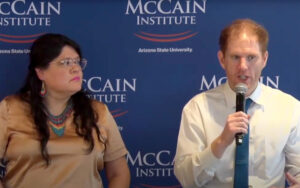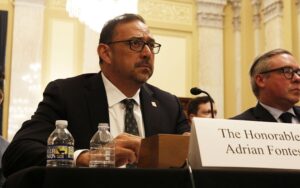- Slug: 100,000 Arizona voters. 550 words.
- 2 Photos available (thumbnails, captions below).
By Miguel Ambriz
Cronkite News
WASHINGTON – A day after asking the Arizona Supreme Court to decide what to do about 98,000 registered voters who’ve never proven their U.S. citizenship, Arizona election officials offered assurances Wednesday.
There’s no sign of widespread voting by non-citizens, they said. It’s a glitch involving driver’s licenses issued before the state began requiring proof of citizenship.
“The voters didn’t themselves do wrong in any way, shape or form,” Stephen Richer, the Maricopa County recorder, said in Washington after a McCain Institute forum on elections and disinformation.
But, he added, “This issue is a real issue, and it’s unfortunate that we have to address it.”
On Tuesday, former President Donald Trump – who claimed that he was cheated in Arizona after losing the 2020 election by about 10,000 votes – cited the glitch to stir a fresh conspiracy theory.
“Trying to Rig the Election!” he posted on his Truth Social platform.
Richer, a fellow Republican, dismissed the assertion.
“We are aware of that fear,” he said, adding that “President Trump has commented on things that didn’t even have a basis in something real that was happening. We’ll try to explain to as many voters as we can exactly what is happening.”
On Tuesday, Richer filed suit against Secretary of State Adrian Fontes, a Democrat, asking the state’s high court to decide whether to let these voters participate fully in the November election.
Fontes called it a “friendly” lawsuit. He and Richer filed a joint motion laying out the problem.
Since 2004, the state has required proof of citizenship to vote in state and local elections. Voters can still vote in federal elections – president, Senate and U.S. House – by attesting that they are citizens, without showing proof.
Most people with driver’s licenses issued after October 1996 were covered, officials said, because they used a birth certificate or some other document that proved citizenship to satisfy a new requirement to show they were in the country legally.
Last week, Richer’s office discovered a non-citizen on the list of registered voters, though the person had not actually cast a ballot.
He brought the issue to the attention of the secretary of state. By Tuesday, officials had identified nearly 98,000 registered voters statewide who had not proven citizenship.
Most, said Fontes, are almost certainly U.S. citizens.
“This was basic voter roll maintenance and it showed us that there is this issue and instead of just kind of pushing it aside and not dealing with it, we’re attacking the problem and making sure that folks can continue to be confident that those of us who are running Arizona’s election,” Fontes said Tuesday at a news conference in Phoenix.
Fontes wants to let these voters participate in elections at all levels of government in November. Richer’s viewpoint is that they should only be allowed to vote in federal elections unless they satisfy the proof-of-citizenship requirement.
That’s what they’ve jointly asked the Arizona Supreme Court to decide.
Fontes has promised to set up an electronic portal if needed to make it easier for registered voters to submit documents.
“This coding error, I would call it, has been fixed,” he said.
Fontes estimated that the affected voters are spread across the state in proportion to the overall population, which means that about 60% are in Maricopa County.
For more stories from Cronkite News, visit cronkitenews.azpbs.org.

